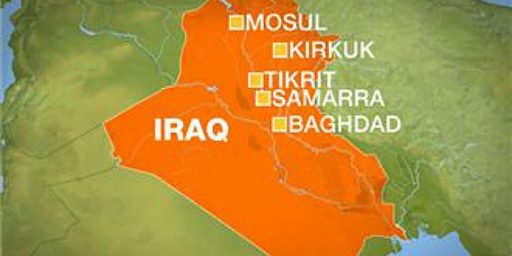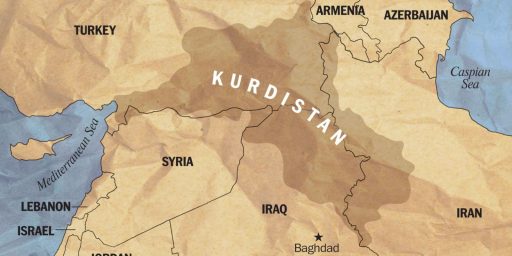Iraq Election Returns
While counting of the ballots from Sunday’s Iraqi elections is proceding slowly, the political fall-out is taking shape. While it has not abated entirely by any means, insurgent violence has tapered substantially. As expected, the majority Shi’ia are likely to dominate the new government, most likely in a coalition with the plurality Kurds. The minority Sunnis, who governed the country harshly when they held power illegitimately, are sulking about the results and trying to cast doubt on its legitimacy but with little success–and the other factions are taking shrewd steps to make the counting process transparent.
Shi’ite Faction Eyes Prime Minister’s Post (WaTi – AP)
The Shi’ite Muslim heading the ticket expected to have won the largest number of parliamentary seats in Iraq’s election said yesterday that his group wants the post of prime minister in the new government. Abdul-Aziz al-Hakim also said in an interview that the new government will include Sunni Arabs, many of whom stayed away from the polls Sunday either out of fear of rebel attacks or because of a clerical boycott call.
The level of violence appears to have plummeted since the election, much as it did for a while after the transfer of sovereignty to the interim Iraqi government in June. It is not clear whether the drop is a result of disillusionment within insurgent ranks, the effects of stringent pre-election security measures, or a pause by the militants to reassess their strategy in light of the balloting. “The coming days and weeks will show whether this retreat will continue or whether it is tactical because of the strike against them,” Prime Minister Iyad Allawi told Al-Iraqiya television. Although no results or turnout figures have been released from Sunday’s elections, U.S. officials say participation appeared much lower in Sunni areas, where the insurgency is strongest, than in other parts of the country.
The Sunni-led Association of Muslim Scholars, which had called for a boycott of the elections, said yesterday that the vote “lacks legitimacy because a large portion of these people who represent many spectra have boycotted it.” As a result, the group said, the still-to-be-named winners would lack a mandate to draft a new constitution — a major task of the national assembly elected Sunday — and should be considered a temporary administration.
Well, it actually is considered a temporary administration by design. Their function is to have legitimately elected Iraqis draft a new constitution and then have follow-on elections in a year. Given that the slates of the two groups that together account for some 80 percent of the population will govern, the legitimacy issue is an obvious sham. Further, the people running the elections are taking extraordinary steps to gain public confidence:
From Ballot to Tally Sheet to Laptop, the Election Results Start Coming Together [RSS] (NYT)
Fewer than half the tally sheets from polling stations around Iraq had arrived at the counting center here by Wednesday morning, and elections officials later decided not to announce early returns but rather to focus on refining a laborious system for transferring data from paper ballots to computers and accurately counting the votes. Elections officials, who spoke on condition of anonymity because of the delicate stage of the work, described a 24-hour operation in which 200 workers were entering data by hand into computers from what would ultimately be 65,000 tally sheets. Each sheet contains the vote totals from a single polling station for either the national assembly, a local governing council or, for provinces in the north, the Kurdish assembly.
The sheets for the national assembly alone have entries for 111 individual political parties, and each entry was being double- and triple-checked Wednesday in a sort of data assembly line on the second floor of a brick building in the Green Zone, the fortified compound housing the interim government and the American Embassy. The early returns had been expected to come from four to six provinces, including some from Baghdad neighborhoods east of the Tigris River. The workers, at long rows of desks, pored over the large paper sheets and tapped the data into new laptop computers. The elections officials said there was no political calculation in the delay. Instead, they said that for the first results it was necessary to carry out even more crosschecks and be sure the system was operating properly. “There is no political machination behind this,” one official said.
The delay was a surprise for anyone who expected Iraq’s new government to take shape quickly. But the official said that, so far, no major snags had turned up. “I want to make it very clear here, we don’t think that we’ve found some vast problem,” he said.
[…]
Each element of the system was considered for its suitability in the conspiracy-rich and infrastructure-challenged nation. Instead of desktop computers, for example, the officials chose laptops, because they draw less power, have batteries to keep them running during blackouts, and take up less space in a crowded room.
Everything is entered by hand, rather than through electronic scanning, because of concerns that Iraqis are more likely to distrust fancy equipment, which is in any case prone to mistakes if the ballots have been folded or crumpled in transit. Putting electronic voting equipment in the polling stations themselves was rejected for some of the same reasons. In one bow to technological efficiency, video cameras on tall tripods were spaced around the counting room and in less-visible crannies in the back where the bags are first handled. Pictures are then fed to flat-screen monitors set up around the edges of the work area. The screens allow election observers to see the process both close-up and from a distance.
Officials here believe that keeping every stage of the count visible to the observers is critical to convincing Iraqis that the elections were aboveboard and legitimate.
Iraq’s Kurds Sketch Demands For Support Of New Leadership (WSJ $)
Kicking off Iraq’s post-election politicking, Kurdish leader Massoud Barzani outlined a tough set of demands for the Shiite political parties vying for the ethnic group’s support. In an interview at his fortified mountain compound here, Mr. Barzani said Kurds would back only Shiites willing to allow Kurds to maintain their current political autonomy, retain their effective veto power over the country’s permanent constitution and take formal control of the oil-rich city of Kirkuk, demands likely to be rejected by the largest Shiite coalition in Sunday’s landmark elections. Mr. Barzani’s remarks come as the Shiite and Kurdish political parties that were the big winners in the vote begin gearing up for a series of debates over fundamental questions about the nature and boundaries of the new Iraq. The 275-person Parliament that will emerge once the votes have been tabulated will appoint a new Iraqi government and oversee the drafting of the country’s permanent constitution.
The final results won’t be released for several more days, but American and Iraqi officials say Iraq’s Shiite Muslim Arab majority is sure to have won a commanding share of power in the assembly, with the Kurds a strong second. The country’s Sunni Muslim Arab minority, which monopolized power during the reign of ousted leader Saddam Hussein, largely sat out the elections and is expected to be underrepresented in the new assembly. Still, the Shiite vote was divided between two feuding slates, which could turn the Kurds into kingmakers. Grand Ayatollah Ali al-Sistani, Iraq’s most revered Shiite religious figure, endorsed the biggest Shiite political grouping, the United Iraqi Alliance. A competing slate led by interim Prime Minister Ayad Allawi, a secular Shiite politician with close ties to many Kurdish and Sunni leaders, also is thought to have done well in the voting. If the United Iraqi Alliance fails to win an outright majority, the Kurds’ support could determine which group takes control.
Mr. Barzani, president of the largely autonomous region known as Kurdistan and the leader of one of the ethnic group’s biggest political parties, made clear in the interview that the Kurds would seek a high price for their support. His remarks reiterated many long-held Kurdish demands, underscoring what will be the group’s opening positions in negotiations with the Shiites that will begin as soon as final election results are announced. “We need certain guarantees,” he said. “There are two nations in Iraq, one Arab and one Kurdish, and we will not allow the Shiites or the Sunnis to make decisions for us.” Most Kurds are Sunni Muslims, but Kurds define themselves by ethnicity, rather than religion, and were harshly repressed by the Sunni Arabs of Iraq.
A high degree of regional autonomy has always been considered a requirement, even by outside observers, so this set of conditions is hardly unreasonable. Indeed, the 13 original states made similar demands in order to ratify our Constitution.
Update: Al-Qaida Defends Poor Showing on Iraqi Election Day (Evan Kohlmann, CT Blog)
Al-Qaida’s Committee in Iraq–led by Abu Musab al-Zarqawi–has released several new statements in response to the results of Iraqi election day. In addition to taking credit for a rocket attack on the U.S. embassy in Baghdad, Al-Qaida has also firmly denied that elections were permitted to take place in the Sunni Triangle, vowing “these elections and their results will not affect us. On the contrary, it will make us more confident, strong, and determined to fight evil and its supporters until the state of Allah is established.” The indignant retort from Al-Qaida avoided discussion of why waves of promised suicide bombers failed to materialize on Iraq’s election day last Sunday. The first half of this week also saw a relative lull in claimed attacks by Al-Qaida in Iraq, suggesting that the group may be recharging and reorganizing after a steady barrage of military operations leading up to the elections.
Indeed. Of course, considering that the pre-election surge was designed to derail the elections, it may simply be that the violence would have diminished regardless. Given that the election turnout wildly exceeded all expectations, though, the terrorists have to be trying to figure out what went wrong.





Do the voters want the U.S. out or do they want they insurgents out? How could we compile any evidence that any theory of the administration is correct and not just more propaganda?
The voters want to not be killed. Since the insurgents are doing the killing…..